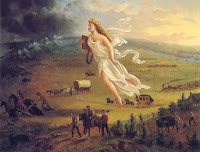 |
| 1872 painting by John Gast |
This phenomenon is but one case of how we cannot escape our past, even as much as we might want to. Frequently, our ties to the past remain unconscious. For example, because of the westward growth of many cities, more people commute by driving into the sun in the morning and into the sun again in the evening -- an inconvenience we would have avoided if it had been the only factor affecting our decisions of where to live and work.
This inconvenience of squinting into the often blinding sun as we commute reveals another way in which we cannot escape the past: We cannot break away entirely from patterns of Nature that were laid down long before Homo sapiens were around. The sun is not about to change its course in response to where we build our houses and places of work. The 20th-century author Maya Angelou cleverly wrote, "Nature has no mercy at all. Nature says, ' I'm going to snow. If you have on a bikini and no snowshoes, that’s tough. I am going to snow anyway.' "
Given that we are unable to detach ourselves entirely from the past life on this planet, how might we relate to it? The answer all of the world's faith-traditions have given is that we should cultivate an appreciation of and a desire to emulate the highest values of the past. Despite that commonality among traditions, people of one faith-tradition have not always comprehended the methods of another. For example, Lin Yutang, an early 20th-century Chinese émigré to the U.S., explains how Christian missionaries mistook Chinese shrines honoring ancestors as being idolatry. Thus the translation of the name for practices at the shrines as "ancestor worship" in English. Lin Yutang clarifies the practices in this way: "Only by the wildest stretch of imagination could they be called idolatry..." Instead, the practice "for the Chinese, is the embodiment of reverence for the past and continuity with the past.... It was the basis of all that was good and honorable and of the desire to go forward."
Maya Angelou also had some succinct words about those who went before: "They existed. We can be. Be and be better. For they existed." That statement could describe non-humans in our evolutionary past just as much as it describes our human ancestors.
~~~
What have you received from the past that you are particularly grateful for?
(The Greeley/Soule quote [1851] is taken from Familiar Quotations by John Bartlett, © 1968. p. 678b.)
(The Angelou quote is from "Maya Angelou: An Interview," Oct. 1974, in Conversations with Maya Angelou, ©1989,)
(The Lin Yutang quote is from From Pagan to Christian by Lin Yutang, © 1959. p. 37.)
(The painting by John Gast [1872] is in the public domain because its copyright has expired.)

1 comment:
As I get older, I recognize more and more of the good things my parents provided me, such as their setting a good example of how to treat other people.
Post a Comment